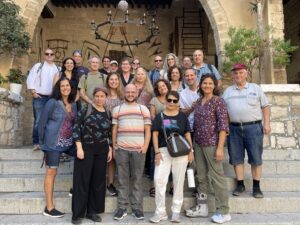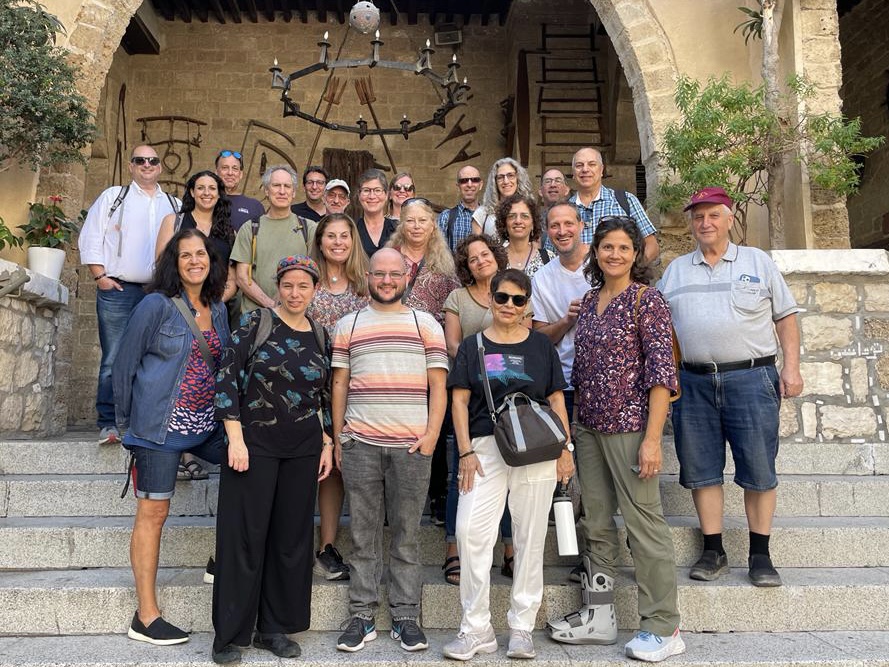
My new friend Dani Ben Joseph lives in Haifa. Born in Israel, the story of his family’s arrival in what was then called Palestine is compelling, if often repeated. As a teenager during World War II, his mother escaped the Nazi onslaught, leaving her parents behind to cross the border out of Hungary on foot, along with a small group of other young Jews, eventually making her way to the Holy Land.
I sometimes wonder, given the dramatic rise of anti-Semitism and vicious nationalism in the United States, whether there might soon come a time when Jews will no longer be welcome—or safe—here. Will my children, one a young adult, the other a spirited teen, steeped as they are in American culture, ever need to consider such an escape themselves? Not to be alarmist, but as Rabbi Sisenwine recently noted, we’ve got to be vigilant.
And yet, until recently, my connection to Israel had always been tenuous. I had never visited. I knew few Israelis, other than one close friend who has lived in the U.S. for decades. But in October, at 53-years-old, I finally made my own first trip to Israel, as part of a TBE delegation visiting Or Hadash, our partner synagogue in Haifa. The idea was to explore ways of deepening spiritual and social connections between the two Temples, and to study how Reform Jews in both countries create and sustain welcoming communities.
Our group spent a week touring the country. Along with Haifa, we visited Nazareth, the Galilee, Tel Aviv and other locations—including one night at a kibbutz in the far north, near the border with Lebanon. We spent many hours talking and workshopping, exploring our shared values and differences. Before the week was out, Or Hadash became my second home, a place of important friendships and meaningful connections.
Dani is the president of Or Hadash, which is one of the oldest reform congregations in Israel. Along with Rabbis Rabbis Na’ama Dafni Kellen and Gabby Dagan, we found that members there are working to grow a progressive spiritual community not unlike our own. I came to know Or Hadash as a community with values that mirror our own—learning, caring, spirituality—where progressive Israelis from all walks of life come together to share their own special version of what it means to live a Jewish life. Both TBE and Or Hadash welcome all members, regardless of their background or income.
Or Hadash clergy and members also place themselves squarely in the fight to protect the civil rights of everyone in Israel, which, after years of political upheaval and conservative shifts, are under threat. The country’s fifth election in four years took place during our visit—we watched the returns live on Israeli television with Or Hadash members—ushered in a revitalized Benjamin Netanyahu as prime minister, and what some consider a deeply radical cabinet, perhaps the most conservative in Israel’s history. We learned that the rights of a wide swath of Israel’s population are under threat, including those of women, the LGBTQ population, and Israel’s Arabic population.
Different from TBE, Or Hadash faces the unique challenge of promoting reform Jewish life in a country that does not officially recognize Reform Judaism as a legitimate movement. The salaries of Orthodox rabbis are paid by the government; reform and conservative rabbis subsist on salaries drawn from community dues. But membership in reform synagogues is small, compared to the U.S. Non-Orthodox Israeli Jews typically consider themselves secular and they generally do not belong to a temple, leaving Or Hadash and similar congregations without a steady source of income.
And while Or Hadash is one of the oldest reform congregations in Israel, it is not officially a synagogue. Non-Orthodox congregations in Israel are incorporated as NGOs, non-governmental organizations, rather than religious institutions. The government considers Or Hadash and all non-Orthodox congregations like it, to simply be community-focused non-profits, draining a measure of legitimacy.
Our relationship with Or Hadash offers TBE a deep connection to Israel, and to Haifa, which is often considered the country’s most diverse and progressive city. Haifa’s is home to a large population of non-Jews, mainly Christian and Muslim Arabs, but also significant Druze and Baháʼí faith communities.
If ‘All Paths Lead to Shalom,’ as TBE’s vision states, then part of that shalom can be found in the connection between TBE and Or Hadash.
*For more information of TBE’s relationship with Or Hadash, contact Jeff Turk, TBE Vice President of K’lal Israel, at jturk@tqlawfirm.com or visit us online.


